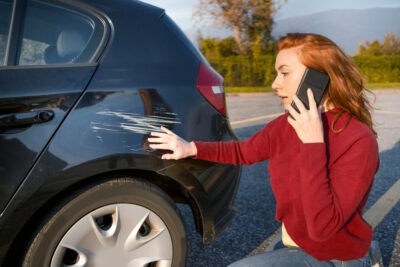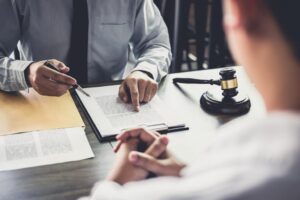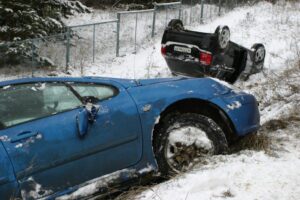
Even a minor car crash can leave you feeling shaken and unsure about what to do next. Whether it’s a fender bender or a small collision, taking the right steps can help protect your health, your finances, and your legal rights. This guide offers clear, practical advice to help you handle the situation with confidence.
If you’re in a minor car accident, it’s important to stay calm and move to a safe area if possible. You should also exchange insurance details and call the police for an official report. Medical attention may still be needed, even without obvious pain.
Consulting an Atlanta car accident lawyer can help you understand how to protect your rights after a minor car accident.
Stay Calm and Assess the Situation
After a minor car crash, staying calm can help you think clearly. Take a deep breath and check your surroundings. Make sure you and your passengers are safe. If the vehicle is in a dangerous spot, and it’s safe to do so, move it off the road to avoid other traffic accidents.
Even in a minor fender bender, it’s important to pay attention to signs of pain, visible injuries, or head trauma. Some injuries may not be clear right away, especially spinal damage or internal bleeding. Always check how your body feels before deciding what to do next.
If you’re not injured and can move safely, look for vehicle damage and anything that might suggest hidden issues. Damage may look small, but it still requires automotive repairs. Documenting visual evidence now can support your insurance claim and help later with repair costs.
Key Steps to Take
- Turn on your hazard lights to warn other drivers
- Set up road flares or cones if available
- Stay out of traffic and wait for emergency responders if needed
- Check on all accident participants and call for help if anyone is hurt
Keeping a cool head at the accident scene can make a big difference in how the next steps go. A lawyer can help you gather all the necessary information and explain what not to say to your insurance company after an auto accident in Georgia.
Get the strong arm
Why You Should Get Medical Care After a Car Accident—Even if You Feel Okay
After a minor collision, you may not notice any pain right away. But some physical injuries, like neck pain or closed head injuries, may take hours or days to appear. Getting medical attention early helps protect your health and creates a record in case you file a personal injury claim.
Even in a minor car crash, hidden injuries like internal bleeding or spinal damage can happen. If untreated, these conditions may become worse over time. Going to urgent care or seeing a doctor helps rule out serious problems and provides helpful documentation for your accident claim.
Why Medical Attention Matters
- A medical report supports your insurance claim
- Delaying care may affect your right to fair compensation
- Some injuries, like chronic pain or soft tissue damage, show up later
- Medical records can help your lawyer, insurance company, or claims adjuster
You may also need care beyond the first visit, including follow-up appointments or physical therapy. Keep all medical bills, records, and doctor notes. These help build a clear picture of the impact the motor vehicle accident had on your body and overall well-being.
Report the Accident and Gather Information at the Scene
Even if no one appears injured and the damage seems minor, reporting the accident and collecting key information can help during the claims process and any future legal or insurance issues.
Keeping a detailed record can make a difference when dealing with insurance companies, auto repair shops, or when questions come up later about fault, medical care, or repair costs.
Calling the Police and Getting a Report
In many areas, calling the police is required for any traffic accident involving property damage, injury, or if vehicles block the road. A police officer can file an official report that includes facts about the scene, statements from drivers, and any visible injuries or vehicle damage.
Even in a minor accident, having an official police report supports your version of events. Ask for the officer’s name, badge number, and the report number. This can be helpful if you later contact your insurance agent or file a personal injury claim or property damage claim.
Collecting Evidence and Information at the Scene
Before leaving the crash scene, gather as much information as possible. Try to stay calm and focus on the details that could support your auto insurance claim or accident report.
Important information to collect:
- Exchange insurance details and contact information with all drivers involved
- Take photos of visible damage, license plates, road flares, and traffic signals
- Write down the names and phone numbers of witnesses and passengers
- Record the time, weather, road conditions, and location
- Save any medical records, visible injuries, or signs of internal bleeding if emergency personnel respond
If safe to do so, take photos showing the full scene, including all vehicles, debris, and road signs. This visual evidence may help if there are disagreements later about the facts of the accident or the cost of repair.
A Car Accident Lawyer Can Help You Understand Your Rights
An accident attorney can provide guidance on your legal rights and help you understand the claims process. Consulting with The Strong Arm™ of John Foy & Associates can be particularly helpful if you’re experiencing ongoing pain or medical issues or if the insurance company denies your claim or offers inadequate compensation.
Remember, taking the right steps after a minor car accident can make a significant difference in your recovery and any potential claims, especially if there’s a dispute about who was at fault or if the insurance coverage is insufficient. Our personal injury lawyers offer free consultations, allowing you to discuss your situation without any financial commitment.
(404) 400-4000 or complete a Free Case Evaluation form





